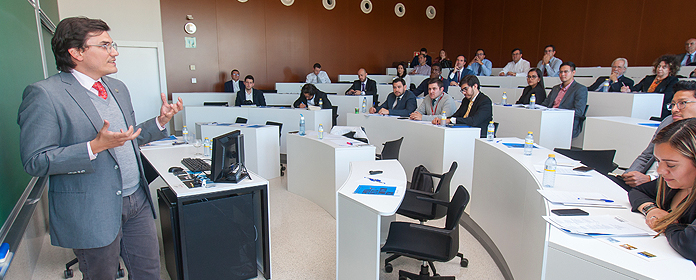2018_11_07_eco_ieh
International Week of update of the Institute business and Humanism
This second edition dealt with the topic: "business, Politics and Social Innovation".

On October 24th, 25th and 26th the high school of business and Humanism of the University of Navarra hosted the II International Week of update. In this edition, which was attended by about 60 people, the theme was topic business ,Politics and Social Innovation.
The program began with the intervention of Professor Rafael Alvira, who developed his hypothesis on the possibility of a "World Civil Society". For Alvira, a world civil society is possible only if it is built on the instructions of a true democracy. This, in turn, becomes "a realizable utopia", provided that it develops into a civil society in which all the social radicals that make it up are in harmony. For the professor, this social formula and "the new technologies together with the establishment, not of a 'civil religion', but 'for civil society', can open the hope of building the much 'urged' world civil society".
Next, from the rationale to internship, Professor Alejandro Ruelas-Gossi presented his Race-to-the-top theory: strategy paradygm. This "degree program a la cima" is a renewed and successful business strategy whose purpose is to generate production value through innovation. It encompasses three very simple questions: where are you, where do you want to go and how do you get there? "The first and third are for execution", he explains, "the second is the most difficult to answer", since the strategy "is not a road map, but a certainty of destination". The core topic of innovation, far from reducing costs, is to "create experiences" that improve the quality of the product and make it more competitive.
Between theory and practice, invited speakers contributed with their communications to the program's development : "Models of business and ethics", Gastón Escudero; "The business as an active subject of social responsibility", Cristina León; "Managing the sustainability of organizations as a way to practice social responsibility", Raquel Sastre; "The role of social innovation in the management of emotions and its contribution in the post-conflict scenario in Colombia", Jesús Girado; "Innovation, culture and Economics: Notes on the human development ", Miguel Alfonso Martínez-Echevarría and Germán Scalzo.
Telefónica's Director of Sustainable Innovation and Diversity, María Aránzazu Díaz-Lladó, referred to sustainable social innovation as an opportunity for growth at business. In her presentation, she highlights, on the one hand, the crucial role of innovation, specifically the role of technology in today's world, which is facing a true digital revolution. On the other hand, he introduces the concept of 'sustainable' innovation, as the tool that aims to address social and/or environmental challenges and generate financial value from them.
Professor Martínez Echevarría advocated a recovery of politics based on a rethinking of the teaching of the Economics, which highlights its interdisciplinary character from a humanistic perspective that does not avoid the basic questions about who man is and what his destiny is. The current challenge of politics lies in respecting the inescapable dimension staff, which is summarized in: "helping each other to live well".
All the themes presented, closely linked, coincide in an essential point: we are at a moment in history in which humanism, business and good governance, are the core topic that drives the development of the individual in particular, and of society in general. Without forgetting that "the business is at the service of the former, and not the other way around".

